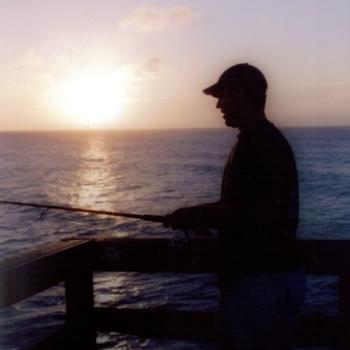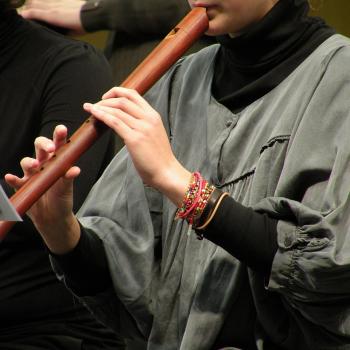On October 21st I gave a brief talk at a “meet and greet” event for the Firehouse Arts & Music space opening soon in Baltimore. This is the prepared text, though I what I actually say at things like this always wanders a bit from that. If you’d rather listen, podcast style, there’s an MP3 here, or you can watch the YouTube video below. (Sound on the video is not very good, sorry. The MP3 is nicer, it’s right from the mixing board.)
Hi folks. I’m Tom Swiss, and I do a bunch of different stuff, poetry and music and shiatsu acupressure and martial arts. And I write about spirituality from what I call a “Zen Pagan” perspective.
There are so many things we could talk about tonight! But I’ve only got a few minutes, so I’d like to give you a big picture overview of what I’ve been working on.
When I talk about spirituality, creativity, and vitality — that’s the title I gave Jason for this — well, we’re hitting spirit, mind, and body here, we’re kind of covering everything. It’s a bit of a big topic, so maybe the best way to look at it is to start with the complete opposite.
Let’s consider a typical working guy these days. On the job he’s expected to do decent enough work to not get fired but not a really good job, because that would be take too long, be too expensive. So there’s not a lot of job satisfaction. There’s no inspiration coming from the day job, no sense that this work is connecting him to something bigger. (Think of the movie Office Space.)
And also there’s no job security, and he’s probably got some huge-ass debt like everybody does. So there’s this low-level stress all the time.
And when he gets home he’s worn out from all that. He’s not just too tired to work on something creative of his own, he’s too worn down to even watch something intellectual on Netflix, a documentary or an art film. (And read a book? Forget it!) So it’s time for reality TV or sitcoms or shoot-’em-up video games. It’s not that he’s too dumb for the good stuff, it’s that he’s too tired. It’s like being starving, but so weak from hunger that you can’t eat.
Speaking of starving, if he had the energy he could make a good healthy meal. But he’s too worn-out to cook something good. So it’s junk. And all the fat and sugar of the Standard American Diet — that’s the S A D, the “sad”, the most appropriate acronym ever — is like a drug that dulls the pain a little. And feeling all bloated from that food and tired from everything, he’s not going to get up and exercise.
Physically ill from bad diet and lack of exercise, his mind is dulled even more. With his mind dulled, he can’t see any way to change his life, to take care of these problems, to maybe find a new job or at least a new approach to the one he’s got.
And so our friend is living what Thoreau called a life of quiet desperation.
Do you see the vicious circle here? Each part of the problem supports the others.
But the good news is that a circle has an infinite number of points where you can cut it and destroy it. When all the problems depend on each other, you don’t have to fix them all at once — knock one down one part and, boom, you’re out of the trap.
But the vicious circle will reassert itself and trap you again. So we have to keep coming back to this process. We have to build our own virtuous circle. We need practices that support us on all three points, on body, mind, and spirit.
And when we can help one person with this, then another, then another…well, that’s how we save the world. One person at a time.
So that’s general outline of how these different things I’m doing fit together.
Now I’d like to get specific for a few minutes about one big idea on the spirit part of that. This is an idea I found in Joseph Campbell’s writings, and it really blew my mind.
Let’s go way, way back, ten or fifteen thousand years ago. This is before agriculture, before civilization. Our ancestors were tribal gatherer-hunters, and their cultures were kind of simple. There wasn’t a lot of division of labor, except maybe by gender.
So if you grab a fifteen-year-old boy out of one of these tribes, he’d pretty much know every aspect of its culture and technology. (At least, the stuff that the men do in that tribe.)
He might not be the best at tracking game, but he can do it. He might not be the best at chipping an arrowhead, but he can make one. He might not be the best at finding medicinal herbs, but he knows what leaves to chew if he’s got a stomach ache.
And he might not be the best at going into a visionary, mystical state of consciousness, but he’s had such experiences. In fact he went on a vision quest as part of his initiation into manhood. In these tribal cultures, everybody got to have the direct spiritual experience. There’s one person who’s the best at that, the tribal shaman, who is the local expert and the guide; but just like anyone could make an arrowhead, anyone could have a vision.
But then agriculture gets going. People settle down in one place to work the land. That’s civilization — villages, towns, cities. Now farming is great and all, but life in a agricultural society is too complicated for one person to know it all. Some people know how to make the tools, and some people know how to raise the crops, and some people know how to fight the guys in the other town, and some people are managers — there’s a complicated social order. In fact it’s so complicated that we have to invent writing to deal with it!
And one of those specialists is the priest. The priest in a civilized society is very different from the tribal shaman.
A shaman is often “chosen by the spirits” in some way. Some of you might have read the autobiography of the Lakota medicine man Black Elk. When he was a kid he was sick for twelve days, almost died, and had his first major vision. It’s like the spirits go “hey, you — ZOT!!! Guess what, you’re going to be shaman now.” It’s not always like that but it’s not an unusual story.
A shaman might apprentice with someone else to learn techniques, but the important point is that their authority doesn’t come from any other person but directly from their relationship to this other state of consciousness.
On the other hand, a priest has to be trained and invested with authority by other priests. Think of a Catholic priest, he can’t just set up shop all on his own inspiration, he’s got to have the bishop do the ritual to put the jim-jam on him, the sacrament of Holy Orders.
And if even the priest has to go through channels, what about us regular folks? We sure don’t get to talk to God or the gods or the spirits or the divine directly anymore, no way; we have to go through the priests. And part of the priest’s job is to maintain the social order. Being the middleman for the divine is a good way to keep people in line.
And that’s the story of civilization…up until about a hundred and fifty or two hundred years ago, when the Industrial Revolution really got rolling. Now that whole model of agricultural civilization is falling apart. We’re just at the start of that, and just starting to build something new. And Campbell points out that in this new scientific and technological age, we need something that’s more in the direct mode of the shaman.
We need that old connection back. One of my favorite descriptions of that is in Alan Ginsberg’s poem “Howl”, where he talks about “angelheaded hipsters burning for the ancient heavenly connection to the starry dynamo in the machinery of night”.
Now I look around this room tonight and I think maybe I see some of those burning angelheaded hipsters, artists and performers and healers and teachers all connecting to that starry dynamo in a hundred different ways.
And Ginsberg also wrote , “…who thought they were only mad when Baltimore gleamed in supernatural ecstasy.” That’s right, Bmore got a shout-out in “Howl”. So let’s keep an eye out for that gleam.
And that’s about all I’ve got time for tonight. So if any of this stuff is interesting to you, I’ve got a book you can buy (I’ve got copies here tonight), and I’ve got a blog called “The Zen Pagan” at Patheos.com, and you can find me on Facebook and Twitter and all like that. I’ll be happy to give you one of my cards so you can look me up. Thanks.
You can keep up with “The Zen Pagan” by subscribing via RSS or e-mail.
If you do Facebook, you might choose to join a group on “Zen Paganism” I’ve set up there. And don’t forget to “like” Patheos Pagan and/or The Zen Pagan over there,
too.













